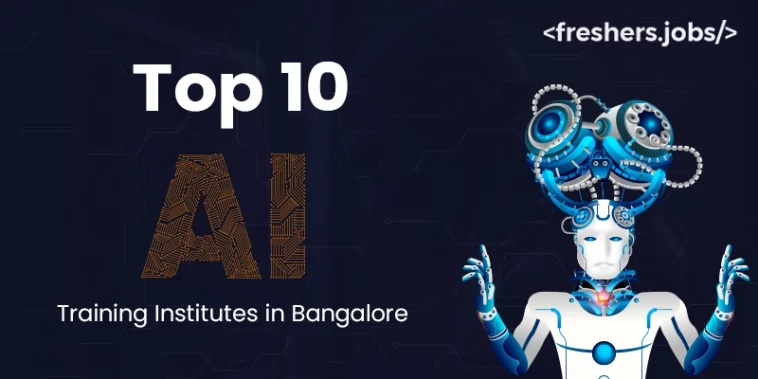Artificial intelligence is the simulation of the ability to perform tasks like learning, problem-solving, and decision-making that humans typically perform. In the corporate world, demand for AI has been growing and will probably continue or increase speed.

Businesses that want to integrate AI technology into their workflows need people with experience in AI, including data scientists, machine learning engineers, and AI specialists. In this investigation, we will examine the Top 10 Artificial Intelligence Training Institute in Bangalore, their significance in today’s corporate environment, benefits, salient features, and employment prospects related to AI.
These are the top 10 Artificial Intelligence Training Institute in Bangalore.
- FITA Academy
- Edureka
- Simplilearn
- Intellipaat
- Besant Technologies
- Inventateq
- ExcelR
- 360DigiTMG
- Datamites Global Training Institute
- IIM Skills
FITA Academy
FITA Academy, an esteemed training institution, offers a comprehensive array of more than 120 courses accessible online and offline. Renowned for providing crucial technical and professional certifications, the academy consistently holds a prominent position in the industry. With a team of more than 1000 trainers, each with decades of experience, the institute has positively influenced the learning journeys of more than 75,000 individuals. The academy reiterates its dedication to delivering high-quality training by establishing multiple branches in Bangalore, Chennai, Pondicherry, Coimbatore, and Madurai. This strategic expansion ensures that individuals in various regions can access top-notch training programs.
Why choose the Artificial Intelligence Course in Bangalore at FITA Academy?
Choosing FITA Academy’s Artificial Intelligence Course in Bangalore is a smart move for several reasons. The course covers various topics, from basic to advanced, including machine learning and deep learning. The course starts with a comprehensive introduction to Python programming and progresses to Machine Learning, where students study various models and techniques. Students will become proficient in Tensorflow and actively participate in Capstone Projects in real time during the course, resulting in a course completion certificate. The curriculum, created by FITA Academy industry professionals, guarantees that students are knowledgeable about the latest techniques and technology in artificial intelligence. The academy places a high priority on accessibility by providing flexible batch scheduling and alternatives for both weekday and weekend classes.
Customized Syllabus of AI Courses in Bangalore
The syllabus for AI Courses in Bangalore is meticulously tailored to cover fundamental principles and the practical application of Python in Machine Learning. It delves into key areas such as Data Science, Python insights, handling Lists, Ranges & Tuples, Python Dictionaries and Sets, Input and Output in Python, Python functions, exception handling, and Regular Expressions. Students undergo thorough training in Data Manipulation, gaining proficiency in understanding Machine Learning Models and Algorithms, including exploration of Supervised and Unsupervised Learning Algorithms.
The curriculum of Artificial Intelligence Course in Bangalore extends to cover topics like Understanding Hypothesis Testing, Implementation of Deep Learning using TensorFlow, Setting Up Deep Learning Environment, Exploring Tensorflow, and Constructing Neural Networks. Advanced segments include an in-depth exploration of Convolutional Neural Networks (CNN), Recurrent Neural Networks (RNN), and Recursive Neural Networks. This well-rounded curriculum ensures students attain a comprehensive understanding of Artificial Intelligence, enabling them to address real-world networking challenges confidently.
Expert Trainers in AI Training in Bangalore
Expert trainers lead the AI Training in Bangalore at FITA Academy with extensive industry experience. These highly skilled instructors are dedicated to imparting theoretical knowledge while sharing valuable real-world insights with students, ensuring they stay abreast of recent industry trends for a comprehensive understanding of this dynamic field.
Incorporating Project Presentation Sessions in Artificial Intelligence Course in Bangalore
A crucial component of FITA Academy’s Artificial Intelligence Course in Bangalore includes project presentation sessions. Recognizing the significance of practical experience in mastering Artificial Intelligence and preparing for a successful career, these sessions enable students to apply acquired knowledge and principles in real-world scenarios, providing invaluable hands-on exposure.
Providing Complimentary Placement Sessions in AI Courses in Bangalore
FITA Academy is dedicated to providing thorough AI Courses in Bangalore that go beyond conventional classroom instruction. The institute offers free placement classes that address important topics including resume writing, interview skill refinement, job placement aid, and career advising, preparing students for the competitive labor market. These carefully thought-out workshops are meant to assist students in reaching their professional goals. FITA Academy offers a wide range of career placement prospects for graduates by utilizing its vast network of over 1,500 partner firms. Through this extensive network, students are guaranteed access to bright job opportunities, enabling a seamless and prosperous transfer into the working world.
Edureka
Edureka is recognized as a reputable online platform offering a flexible Artificial Intelligence Course that covers fundamental to advanced concepts. Despite providing a comprehensive range of courses, the primary emphasis on online learning may limit direct interaction between learners and trainers, potentially resulting in higher costs.
Simplilearn
Simplilearn is an artificial intelligence education provider catering to novice and expert students. Its curriculum is enhanced with educational resources. The heavy emphasis on online learning may limit the amount of face-to-face interaction between teachers and students, and the cost of the courses may be comparatively more significant than at other universities.
Intellipaat
Intellipaat focuses on providing Artificial Intelligence Courses with a concentration on Machine Learning, aiming to enhance skills and impart valuable industry knowledge. The predominant emphasis on online courses may decrease direct interaction between learners and trainers, making it potentially less favorable for budget conscious learners.
Besant Technologies
Besant Technologies offers comprehensive Artificial Intelligence Classes with real-time assistance. Despite providing extensive facilities, it may not be the top choice for individuals seeking a more profound learning experience.
Inventateq
Specializing in offering tailored Artificial Intelligence Courses designed to meet industry-specific requirements, Inventateq may not provide as comprehensive placement support compared to certain other institutes.
ExcelR
ExcellR provides an extensive Artificial Intelligence course, equipping learners with essential skills. However, this course may not be the preferred choice for those seeking a more extensive and in-depth learning experience compared to other institutes.
360DigiTMG
Known for providing specialized Artificial Intelligence Classes tailored to industry-specific needs, 360DigiTMG may not offer as comprehensive practical training compared to other institutes.
Datamites Global Training Institute
Specializing in delivering comprehensive Artificial Intelligence Classes covering a range of concepts, Datamites Global Training Institute may provide these benefits while offering relatively less extensive placement support than certain other institutes.
IIM Skills
IIM Skills offers Artificial Intelligence courses with a focus on imparting essential skills. It’s important to note that the practical training component may not be as extensive as some other institutes.
FreshersJobs conducted extensive study before carefully selecting these institutes, considering factors such as brand reputation, student feedback, and a proven track record of student achievements.
The Role of Artificial Intelligence in the Modern Business World
Artificial Intelligence (AI) is a vital part in contemporary business by transforming various aspects of operations and decision-making. A significant contribution is evident in data analysis and interpretation. AI algorithms swiftly process large datasets to extract meaningful insights and patterns, enhancing strategic decision-making with a data-driven approach. AI significantly improves customer experiences, employing AI-powered chatbots for instant and personalized responses to inquiries. Machine learning algorithms analyze customer behavior, enabling businesses to tailor offerings and marketing strategies, fostering customer satisfaction and brand loyalty. Artificial intelligence (AI) technologies enable automation, which simplifies monotonous jobs and frees up staff members to work on more creative and challenging projects.
Artificial intelligence (AI) is used by robotic process automation (RPA) to do activities like data entry and processing, which lowers errors and boosts operational efficiency. Predictive analytics relies heavily on artificial intelligence (AI) to help businesses predict patterns and results. This is especially useful in supply chain management to optimize distribution networks and inventory levels. Predictive analytics, which is powered by AI, helps improve risk management and sales forecasting. In order to protect sensitive company data, artificial intelligence (AI) is also used in threat detection and prevention. Machine learning algorithms are used to detect unexpected patterns in network traffic, identify possible security breaches, and mitigate risks in real-time.
Among the many facets of AI’s significance in contemporary business is:
- the conversion of data into insights that can be put to use.
- improving communications with customers.
- automating processes.
- making predictive analytics easier.
- bolstering security protocols.
Businesses that use AI technologies gain a competitive advantage as they adjust to the needs of a technologically sophisticated and data-driven marketplace.
What is Artificial Intelligence?
When robots are programmed to mimic human intelligence, they can learn, think, and carry out tasks that normally require human cognitive abilities. This is known as artificial intelligence (AI). AI aims to create systems capable of tasks like visual perception, speech recognition, decision-making, and language translation, traditionally associated with human intelligence. AI encompasses various technologies and methodologies, including natural language processing, machine learning, computer vision, and robotics. Machine learning, a subset of AI, involves training algorithms on extensive datasets to recognize patterns and make predictions or decisions without explicit programming. This enables AI systems to improve their performance through experience.
There are two primary types of AI:
- Narrow or Weak AI: Designed and trained for a specific task, excelling in performing a particular function, such as image recognition or language translation, but lacking more general cognitive abilities.
- General or Strong AI: An advanced form of AI that can understand, learn, and apply knowledge across a broad range of tasks, similar to human intelligence. The goal of general AI is still unattainable, and study and conjecture on the topic are still ongoing.
AI applications are diverse in various industries, including healthcare, finance, education, and entertainment. Examples include virtual personal assistants (like Siri or Alexa), recommendation systems (used by streaming services), autonomous vehicles, and medical diagnosis tools. While AI offers promise for improving efficiency and addressing complex problems, it raises ethical and societal concerns such as job displacement, algorithm bias, and responsible AI use in decision-making processes. Research and development never stop pushing the limits of what machines can accomplish as technology develops.
Advantages of Artificial Intelligence
Automation and Efficiency
- AI facilitates the automation of repetitive tasks, enhancing operational efficiency and relieving human resources from routine responsibilities.
- Robotic Process Automation (RPA) enables machines to execute rule-based tasks, enhancing accuracy and speed.
Data Analysis and Insights
- AI systems swiftly process and analyze extensive data, extracting meaningful patterns and insights challenging for humans to discern.
- Predictive analytics, powered by AI, supports forecasting trends and informed decision-making.
Enhanced Decision-Making
- AI algorithms analyze complex datasets, providing valuable insights for decision-making in fields like finance, healthcare, and marketing.
- Machine learning models adapt and improve decision-making capabilities over time based on new data.
Improved Customer Experiences
- AI-driven chatbots and virtual assistants deliver instant and personalized responses, enhancing overall customer experience.
- AI-driven personalization in marketing boosts customer engagement by tailoring content and recommendations.
Innovation and Creativity
- By automating repetitive processes, AI technologies promote innovation and free up human workers to concentrate on more intricate and creative areas of their work.
- Generative AI models create new and original content, such as art, music, and literature.
Medical Applications
- AI aids in medical diagnosis by analyzing medical images, predicting disease outcomes, and identifying patterns in patient data.
- Drug discovery processes are expedited using AI algorithms to analyze molecular structures and identify potential compounds.
Safety and Security
- AI contributes to cybersecurity by detecting and preventing cyber threats through pattern analysis in network traffic and anomaly identification.
- Autonomous vehicles leverage AI for real-time decision-making, enhancing road safety.
Language Translation and Natural Language Processing
- AI-powered language translation services facilitate communication across different languages, fostering global collaboration.
- Natural Language Processing (NLP) enables machines to understand and generate human-like language, enhancing user interactions.
Efficient Resource Utilization: AI optimizes resource allocation in various industries, including energy, manufacturing, and transportation, leading to cost savings and reduced waste.
Accessibility and Inclusivity: AI technologies contribute to creating accessible solutions for individuals with disabilities, improving inclusivity in various digital interfaces.
Components of Artificial Intelligence
Machine Learning (ML)
- Supervised Learning: Using input-output pairs as their basis for prediction, models are trained on labeled data.
- Unsupervised Learning: Algorithms learn patterns in unlabeled data without predefined outputs.
- Reinforcement Learning: Agents pick up skills via trial and error, with consequences for their decisions.
Natural Language Processing (NLP)
- Enables machines to understand, interpret, and generate human language.
- Includes text analysis, sentiment analysis, and language translation.
Computer Vision: Involves teaching machines to interpret visual information, including image and video recognition, object detection, and facial recognition.
Neural Networks
- Computational models inspired by the human brain.
- Deep learning, a subset, employs deep neural networks to grasp intricate representations.
Expert Systems: Mimic human decision-making in a specific domain, using knowledge representation and inference engines.
Speech Recognition
- Converts spoken language into written text.
- Used in applications like voice assistants and transcription services.
Robotics: Integrating AI into robotics enables machines to perceive surroundings, make decisions, and execute tasks.
Knowledge Representation: Captures information in a format machines can utilize for problem-solving, decision-making, and task execution.
Planning and Decision Making: AI systems plan and make decisions based on available information, weighing options and selecting suitable actions.
Genetic Algorithms: Optimization algorithms inspired by natural selection evolve solutions over multiple generations.
Machine Perception: Enables machines to perceive and interpret sensory data, understanding visual, auditory, or tactile information.
Cognitive Computing: Combines various AI technologies to mimic human thought processes, including reasoning, learning, problem-solving, and natural language understanding.
AI Chips and Hardware: Specialized hardware like Graphics Processing Units (GPUs) and Tensor Processing Units (TPUs) accelerates AI computations, particularly in deep learning tasks.
Ethical and Explainable AI: Considers ethical principles in AI development and aims to develop systems that transparently explain their decisions.
Job Opportunities in the Artificial Intelligence Field
- AI/ML Intern: Responsibilities may include data preprocessing, model training, and basic algorithm implementation, gaining hands-on experience in ongoing projects.
- Junior Data Scientist: Responsibilities involve working with datasets, performing basic analysis, and supporting the development of machine learning models. Collaboration with senior data scientists and engineers is common.
- AI Research Assistant: Works on research projects and literature reviews and supports the development of experimental models, often collaborating with senior researchers and scientists.
- Data Scientist: Develops and implements machine learning models for data analysis, extracting insights, and presenting findings to support business decisions.
- Machine Learning Engineer: Focuses on designing and deploying scalable machine learning systems, optimizing algorithms for performance and working with data pipelines.
- AI Developer: Works on developing AI applications, including software design and coding, collaborating with cross-functional teams to integrate AI into various products.
- Senior Data Scientist: Leads and mentors a team of data scientists, playing a key role in developing advanced analytical solutions and models.
- Principal Machine Learning Engineer: Provides strategic direction in developing machine learning infrastructure, leading the design and implementation of complex ML systems.
- AI Architect: Creates and manages the use of AI solutions within a company, working with executives to match business goals with AI tactics.
- Director of AI Research: Leads a team of researchers in exploring advanced AI concepts and applications, shaping the long-term AI strategy for the organization.
- Chief AI Officer (CAIO) or Chief Data Officer (CDO): Provides executive leadership in defining and executing the AI strategy, ensuring alignment with overall business goals.
- AI Ethicist or AI Governance Specialist: Focuses on ethical considerations in AI development and deployment, shaping policies and guidelines for responsible AI use.
- AI Product Manager: Oversees the development and enhancement of AI-powered products, defining product roadmaps through collaboration with cross-functional teams.
- AI Consultant: Works with clients to understand their business needs and provides AI solutions, offering expertise in implementing AI strategies.
The requirement for artificial intelligence (AI) in the business landscape underscores the transformative influence of this advanced technology. There is a competition amongst multinational corporations to harness the power of artificial intelligence, which is driving up demand for experts in data science and machine learning. This surge is not a temporary trend; rather, it seems to be a lasting force propelling businesses toward a future characterized by intelligent automation and data-driven decision-making. We explored the Top 10 Artificial Intelligence Training Institute in Bangalore, delving into the current role of AI in the business world, its significance, essential components, and the range of job opportunities it presents.




